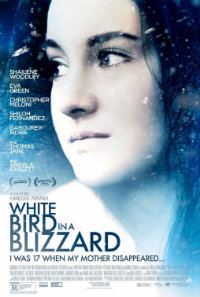Skin Deep: Araki Weathers a 4th Decade in Filmmaking
 Gregg Araki’s latest ode to youthful alienation, White Bird in a Blizzard, is his most restrained and grounded work to date. It’s a quiet and astute film that derives its mystery from the err of human assumption and like most, or arguably all, of Araki’s work, this posits a naïve protagonist trying to come to terms with an unthinkably harsh world.
Gregg Araki’s latest ode to youthful alienation, White Bird in a Blizzard, is his most restrained and grounded work to date. It’s a quiet and astute film that derives its mystery from the err of human assumption and like most, or arguably all, of Araki’s work, this posits a naïve protagonist trying to come to terms with an unthinkably harsh world.
Unraveling slowly as 17-year-old Kat Connor (Shailene Woodley) dissects and rationalizes the world and the people around her following the disappearance of her mother, Eve (Eva Green). Kat is at a precipice, literally escaping the baby fat that marginalized and repressed her in early adolescence to emerge into an adult world unprepared, grappling with a sexuality she’s not entirely comfortable with or certain of. She’s also indirectly trying to relate this to her relationship with her now absent mother whose youthful beauty and thirst for life gradually slipped away under the confines of domestic tedium and a loveless marriage to the aloof and seemingly meek Brock (Christopher Meloni).
Most of this comes out during discussions with her therapist (Angela Bassett), which is a device used in conjunction with flashback to give us a sense of how Kat came to have her opinions on the state of her parents’ marriage. Like most young girls, Kat identifies with and defends her father, noting the inherent competitiveness of mother-daughter relationships. Araki, whose previous work—save Splendor and Smiley Face—has assumed the disposition of a damaged and confused homosexual, does demonstrate a rather keen understanding of female competition and the manner by which female sexuality presents and dominates. Kat, while putting together the pieces of her mother’s identity, struggles with her dippy boyfriend’s (Shiloh Hernandez) decreased libido by seducing the older cop (Thomas Jane) assigned to her mother’s case. The transference isn’t subtle and Araki isn’t interested in gussying it up to be anything more than it is.
Though tempered, Araki’s style is still specific and unique. There’s a dreamlike insularity to the world he’s created. In earlier works, he’s juxtaposed his characters with wildly dynamic sets that are deliberately constrained and stylized to reflect the inner-feelings of those in the space. Blizzard doesn’t have the same dramatic colours and idiosyncratic set dressing but it does exploit its era—the late ‘80s—for its harsh, even tacky, consumer aesthetic. Whether Kat is in her basement, her bedroom or in her therapists’ office, there’s a sense of confinement. Each room is small and filled with items, reiterating the titular assertion of women being birds trapped in a socially imposed cage.
Kat’s cage is the vacuum of identity. Even though she reached pubescence at the tail end of the decade where the nuclear family was rigidly defined, there’s still the ghost of traditionalist feminine passivity looming over her. Her perspective on this is very much ambivalent. While Kat condemns her mother’s erratic behaviour, complaining about her drunken stupors and tendency to aggressively perform her sexuality, verbally acknowledging the jealousy she has for her daughter, she’s also quick to justify and defend her mother’s actions. She’s also quick to underestimate both of her parents, assuming her father’s quietness means weakness and that her mother’s behaviour is specific to her fear of aging and losing her beauty.
This is where White Bird in a Blizzard finds its power and where Araki exploits the forced perspective he offers us. Since our window into this world is through the eyes of Kat, we assume that the titular white bird in a blizzard is her, struggling to have an identity or meaning in a chaotic world where she’s invisible and easily lost. But as Eve’s plight starts to take shape, we start to realize that Kat isn’t the only bird trapped in a blizzard, which puts an intriguing spin on just how the faults and problems of our parents can shape who we are and how we see the world.
An abundance of interesting ideas about adolescent development and sexuality as a presentation of parental guidance fizzle up throughout this devastating and surprisingly moving work. Like Mysterious Skin, it shows that even though Gregg Araki has an aptitude for sensationalized teen odysseys like Kaboom or The Doom Generation, he’s also quite good at modifying his style to say something subtle and touching. It’s true that there are still some flaws: Kat’s transition from high school to college and back for a spring vacation is rushed and unconvincing structurally (the single conversation with an unestablished character in a dorm room doesn’t give us a sense of college space), for example but this doesn’t hinder the overall power of the film.
Moreover, Woodley’s convincing portrayal of a girl trying to discover herself is bang on even though it’s overshadowed by the absolutely brilliant, Oscar-caliber performance from Eva Green as a woman on the verge of an emotional breakdown. Similarly, the peripheral set design and omnipresent ’80s soundtrack create an environment that persists in giving these characters a foundation and a world to embody and maneuver within.
It’s hard to imagine anyone walking away from White Bird in a Blizzard without at least some visceral or emotional reaction, especially considering how powerful the final moments are.
★★★★/☆☆☆☆☆


